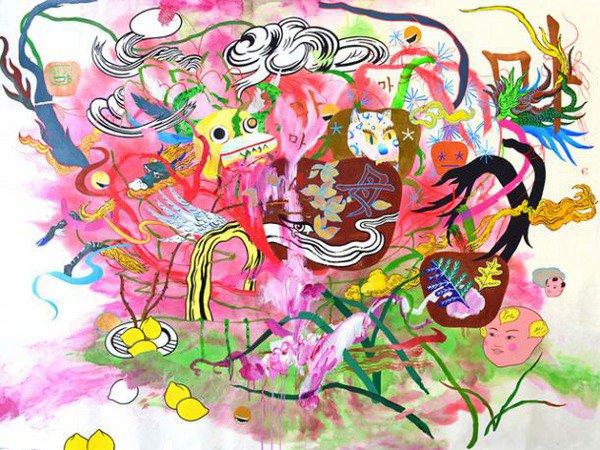Jiha Moon
dal 31/1/2014 al 7/3/2014
Segnalato da
31/1/2014
Jiha Moon
Ryan Lee Gallery, New York
Foreign Love Too. Employing a range of traditional and non-traditional materials (from oil paint and watercolor to embroidery and synthetic hair) Moon carefully orchestrates hyper-dense compositions.

RYAN LEE is pleased to present Jiha Moon: Foreign Love Too, a solo exhibition of new work by the Korean-born, Atlanta-based artist. On view is a selection of mixed media works on paper and ceramic sculptures, both free standing and wall-mounted. Employing a range of traditional and non-traditional materials – from oil paint and watercolor to embroidery and synthetic hair – Moon carefully orchestrates hyper-dense compositions. They not only reference diverse art historical styles, but also reference the commonality and disparity of multiple cultures. The title of the exhibition refers to the societal obsession with foreignness and the never-ending quest for “the new” that simultaneously expands and restricts our understanding of otherness. The show will run concurrently with Jiha Moon: Falk Visiting Artist; Foreign Love at the Weatherspoon Art Museum in Greensboro, NC, which is on view through April 13, 2014.
Culling elements from American, Korean, Japanese, Chinese, and other Eastern and Western cultures, Moon’s work explores the multiplicity of 21st century cultural identities influenced by popular culture, technology, racial perceptions, and folklore. She juxtaposes classical Asian motifs with contemporary and digital iconography such as the Angry Bird and Hello Kitty logos in contrast to the Korean folk mask, Tal. These co-existing yet disparate elements reflect the bombardment of visual information typical in daily life. Moon’s references to multiple artistic movements— from ancient calligraphy to abstract expressionism to pop art— are emblematic of the plurality and highly referential nature of contemporary art.
At first glance, the works conjures kitschy Asian references, but upon closer examination, the work directly questions the role and necessity of cultural assimilation in an increasingly globalized world. A Georgia resident for more than a decade, Moon uses recurring imagery of the peach, for example, to explore the complexities of a famous regional icon by highlighting its use as a potent symbol of ancient Korean mythology. In “Peach Maskill,” a work executed on traditional Japanese Hanji paper, the peach not only gives shape to the overall work, but also suggests a more lascivious and humorous interpretation of the colloquialism, “Georgia Peach.” Here, the peach takes on qualities of many culture-specific masks, such as Hopi Kachina, Mexican, African, and digital (emoticons) masks, to examine the dual nature of identity and anonymity. Many of the mask works include numerous eyes, some with single lids and others with double lids, in response to the popularity of double lid plastic surgery in Korea intended to Westernize the eye.
The ceramics on display comprise the artist’s first foray into the medium. Ancient techniques such as slip caste and crackle glaze are used in tandem with Moons characteristic iconography. The wall mounted works, called Norigae, reference the intricacy and time-consuming nature of certain ethnic beauty practices, including Asian, Indian, Caribbean, African, and Celtic traditions. Additionally, familiar archetypes commonly found in commercial product logos, like the tigers of Tiger Balm or dragons and bamboo on chopstick wrappers, evoke stereotypical Western modes of commodification. Moon is acutely aware of how Western perceptions of Asian-ness impact and reflect the current reality of both cultures. Through these reconfigurations, Moon explores cultural heritage, the assumptions made about it, and its significance or lack thereof in contemporary life. Moons’ work confronts the breakdown of cultural barriers. She challenges common notions of East and West, ancient and modern, high and low to develop a rich visual vocabulary all her own.
Press contact: Abby Margulies, abbymargulies@gmail.com
Opening view Saturday, February 1, 4-6 pm
Ryan Lee Gallery
527 West 26th Street, New York
Hours: Tuesday – Saturday, 10am – 6pm
Free admission



